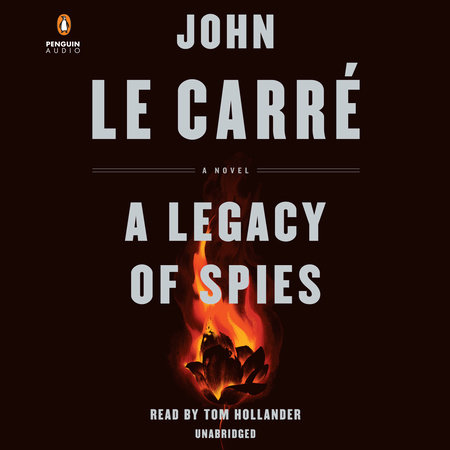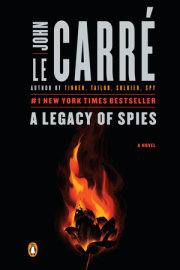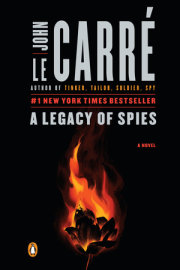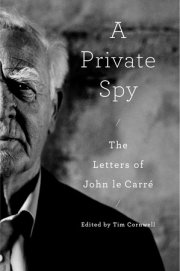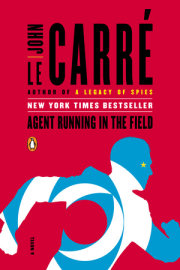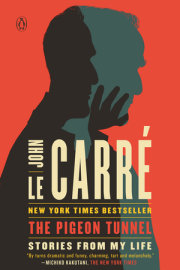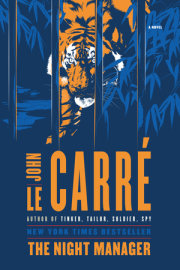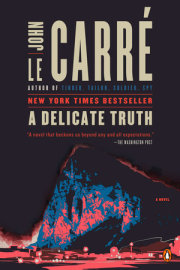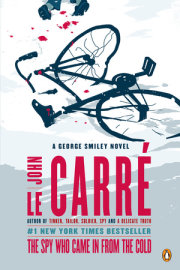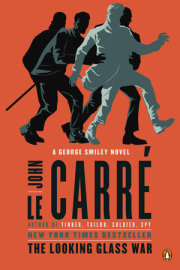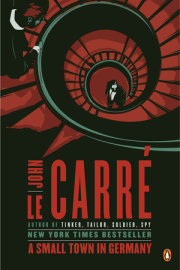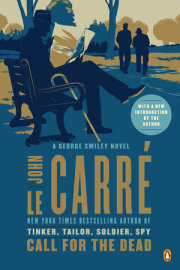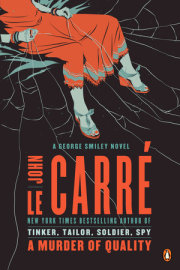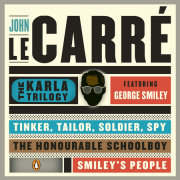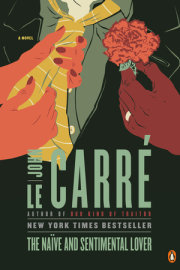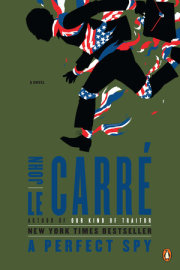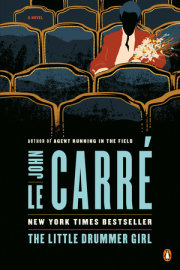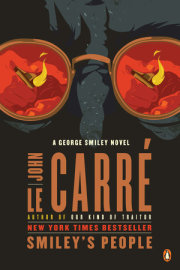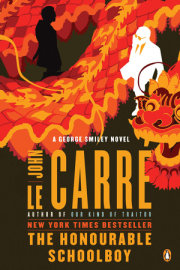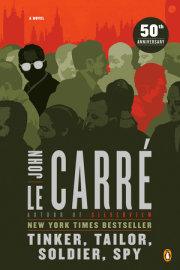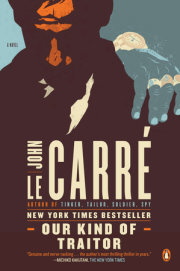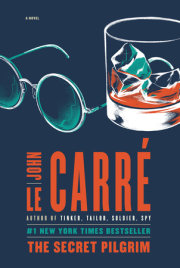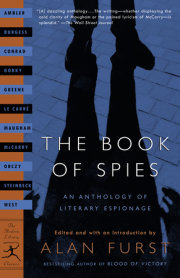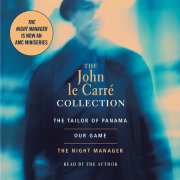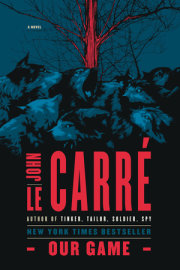Chapter One
What follows is a truthful account, as best I am able to provide it, of my role in the British deception operation, codenamed Windfall, that was mounted against the East German Intelligence Service (Stasi) in the late nineteen fifties and early sixties, and resulted in the death of the best British secret agent I ever worked with, and of the innocent woman for whom he gave his life.
A professional intelligence officer is no more immune to human feelings than the rest of mankind. What matters to him is the extent to which he is able to suppress them, whether in real time or, in my case, fifty years on. Until a couple of months ago, lying in bed at night in the remote farmstead in Brittany that is my home, listening to the honk of cattle and the bickering of hens, I resolutely fought off the accusing voices that from time to time attempted to disrupt my sleep. I was too young, I protested, I was too innocent, too naive, too junior. If you’re looking for scalps, I told them, go to those grand masters of deception, George Smiley and his master, Control. It was their refined cunning, I insisted, their devious, scholarly intellects, not mine, that delivered the triumph and the anguish that was Windfall. It is only now, having been held to account by the Service to which I devoted the best years of my life, that I am driven in age and bewilderment to set down, at whatever cost, the light and dark sides of my involvement in the affair.
How I came to be recruited to the Secret Intelligence Service in the first place–the ‘Circus’ as we Young Turks called it in those supposedly halcyon days when we were quartered, not in a grotesque fortress beside the River Thames, but in a fustian Victorian pile of red brick, built on the curve of Cambridge Circus–remains as much of a mystery to me as do the circumstances of my birth; and the more so since the two events are inseparable.
My father, whose acquaintance I barely remember, was according to my mother the wastrel son of a wealthy Anglo-French family from the English midlands, a man of rash appetites, fast-diminishing inheritance and a redeeming love of France. In the summer of 1930, he was taking the waters in the spa town of Saint-Malo on Brittany’s north coast, frequenting the casinos and
maisons closes and generally cutting a dash. My mother, sole offspring of a long line of Breton farmers, at that time aged twenty, also happened to be in town, performing the duties of a bridesmaid at the wedding of the daughter of a wealthy cattle auctioneer. Or so she claimed. However, she is a single source, not above a little decoration when the facts were against her, and it would not at all surprise me if she came into town for less upright purposes.
After the ceremony, so her story goes, she and a fellow bridesmaid, the better for a glass or two of champagne, played truant from the reception and, still in their finery, took an evening stroll along the crowded promenade, where my father was also strolling with intent. My mother was pretty and flighty, her friend less so. A whirlwind romance followed. My mother was understandably coy about the pace of it. A second wedding was hastily arranged. I was the product. My father, it appears, was not naturally connubial, and even in the early years of marriage contrived to be more absent than present.
But now the story takes an heroic turn. War, as we know, changes everything, and in a trice it had changed my father. Scarcely had it been declared than he was hammering on the doors of the British War Office, volunteering his services to whoever would have him. His mission, according to my mother, was to save France single-handed. If it was also to escape the ties of family, that is a heresy I was never permitted to utter in my mother’s presence. The British had a newly formed Special Operations Executive, famously tasked by Winston Churchill himself with ‘setting Europe ablaze’. The coastal towns of south- west Brittany were a hotbed of German submarine activity and our local town of Lorient, a former French naval base, the hottest bed of all. Five times parachuted into the Breton flatlands, my father allied himself with whatever Resistance groups he could find, caused his share of mayhem and died a gruesome death in Rennes prison at the hands of the Gestapo, leaving behind him an example of selfless dedication impossible for any son to match. His other legacy was a misplaced faith in the British public school system, which notwithstanding his dismal performance at his own British public school condemned me to the same fate.
The earliest years of my life had been passed in paradise. My mother cooked and prattled, my grandfather was severe but kindly, the farm prospered. At home we spoke Breton. At the Catholic primary school in our village, a beautiful young nun who had spent six months in Huddersfield as an au pair taught me the rudiments of the English language and, by national decree, French. In the school holidays I ran barefoot in the fields and cliffs around our farmstead, harvested buckwheat for my mother’s crêpes, tended an old sow called Fadette and played wild games with the children of the village.
The future meant nothing to me until it struck.
At Dover, a plump lady called Murphy, cousin to my late father, detached me from my mother’s hand and took me to her house in Ealing. I was eight years old. Through the train window I saw my first barrage balloons. Over supper, Mr. Murphy said it would all be over in months and Mrs. Murphy said it wouldn’t, both of them speaking slowly and repeating themselves for my benefit. The next day Mrs. Murphy took me to Selfridges and bought me a school uniform, taking care to keep the receipts. The day after that, she stood on the platform at Paddington station, and wept while I waved goodbye to her with my new school cap.
The Anglicization wished on me by my father needs little elaboration. There was a war on. Schools must put up with what they got. I was no longer Pierre but Peter. My poor English was ridiculed by my comrades, my Breton-accented French by my beleaguered teachers. Our little village of Les Deux Eglises, I was informed almost casually, had been overrun by Germans. My mother’s letters arrived, if at all, in brown envelopes with British stamps and London postmarks. It was only years later that I was able to imagine through whose brave hands they must have passed. Holidays were a blur of boys’ camps and proxy parents. Redbrick preparatory schools turned into granite-grey public schools, but the curriculum stayed the same: the same margarine, the same homilies on patriotism and Empire, the same random violence, careless cruelty and unappeased, unaddressed sexual desire. One spring evening in 1944, shortly before the D-Day landings, the headmaster called me to his study and told me that my father had died a soldier’s death, and that I should be proud of him. For security reasons, no further explanation was available.
I was sixteen when, at the end of a particularly tedious summer term, I returned to peacetime Brittany a half-grown English misfit. My grandfather had died. A new companion named Monsieur Emile was sharing my mother’s bed. I did not care for Monsieur Emile. One half of Fadette had been given to the Germans, the other to the Resistance. In flight from the contradictions of my childhood and fuelled by a sense of filial obligation, I stowed away on a train to Marseilles and, adding a year to my age, attempted to enlist in the French Foreign Legion. My quixotic venture came to a summary end when the Legion, making a rare concession to my mother’s entreaties on the grounds that I was not foreign but French, released me back into captivity, this time to the London suburb of Shoreditch, where my father’s unlikely stepbrother Markus ran a trading company importing precious furs and carpets from the Soviet Union–except he always called it Russia–and had offered to teach me the trade.
Uncle Markus remains another unsolved mystery in my life. I do not know to this day whether his offer of employment was in some way inspired by my later masters. When I asked him how my father had died, he shook his head in disapproval–not of my father, but of the crassness of my question. Sometimes I wonder whether it is possible to be born secret, in the way people are born rich, or tall, or musical. Markus was not mean, or tight, or unkind. He was just secret. He was middle-European, his name was Collins. I never learned what it was before that. He spoke accented English very fast, but I never learned what his mother tongue was. He called me Pierre. He had a lady friend named Dolly who ran a hat shop in Wapping and collected him from the door of the warehouse on Friday afternoons. But I never knew where they went for their weekends, whether they were married to each other, or to other people. Dolly had a Bernie in her life, but I never knew whether Bernie was her husband, her son or her brother, because Dolly was born secret too.
And I don’t know even in retrospect whether the Collins Trans- Siberian Fur & Fine Carpet Company was a bona fide trading house, or a cover company set up for the purpose of intelligence gathering. Later, when I tried to find out, I met a blank wall. I knew that every time Uncle Markus was preparing to visit a trade fair, whether in Kiev, Perm or Irkutsk, he trembled a lot; and that when he came back, he drank a lot. And that in the days leading up to a trade fair, a well-spoken Englishman called Jack would swing by, charm the secretaries, pop his head round the door to the sorting room and call ‘hullo, Peter, all well with you?’ – never Pierre – then take Markus out to a good lunch somewhere. And after lunch, Markus would come back to his office and lock the door.
Jack claimed to be a broker in fine sable, but I know now that what he really dealt in was intelligence, because when Markus announced that his doctor wouldn’t allow him to do fairs any more, Jack suggested I come to lunch with him instead, and took me to the Travellers Club in Pall Mall, and asked me whether I would have preferred life in the Legion, and if I was serious about any of my girlfriends, and why I had fled my public school considering I’d been captain of boxing, and whether I had ever thought of doing something useful for my country, by which he meant England, because if I felt I’d missed out on the war on account of my age, this was my chance to catch up. He mentioned my father once only, over lunch, in terms so casual that I might have supposed the topic could equally well have slipped his memory altogether:
‘Oh, and concerning your much revered late papa. Strictly off the record, and I never said this. All right by you?’
‘Yes.’
‘He was a very brave chap indeed, and did a bloody good job for his country. Both his countries. Enough said?’
‘If you say so.’
‘So here’s to him.’
Here’s to him, I agreed, and we drank a silent toast.
At an elegant country house in Hampshire, Jack and his colleague Sandy, and an efficient girl called Emily, whom I immediately fell in love with, gave me the short course in clearing a dead letter box in mid-town Kiev–actually a chunk of loose masonry in the wall of an old tobacco kiosk–of which they had a replica set up in the orangery. And how to read the safety signal that would tell me it was all right to clear it–in this case a piece of tattered green ribbon tied to a railing. And how afterwards to indicate that I had cleared the letter box, by tossing an empty Russian cigarette packet into a litter bin next to a bus shelter.
‘And maybe, Peter, when you apply for your Russian visa, better to use your French passport rather than your Brit version,’ he suggested breezily, and reminded me that Uncle Markus had an affiliate company in Paris. ‘And Emily’s off-limits, by the way,’ he added, in case I was thinking otherwise, which I was.
*
And that was my first run, my first ever assignment for what I later came to know as the Circus, and my first vision of myself as a secret warrior in my dead father’s image. I can no longer enumerate the other runs I made over the next couple of years, a good half-dozen at least, to Leningrad, Gdansk and Sofia, then to Leipzig and Dresden, and all of them, so far as I ever knew, uneventful, if you took away the business of gearing yourself up, then gearing yourself down again afterwards.
Over long weekends in another country house with another beautiful garden, I added other tricks to my repertoire, such as counter-surveillance and brushing up against strangers in a crowd to make a furtive hand-over. Somewhere in the middle of these antics, in a coy ceremony conducted in a safe flat in South Audley Street, I was allowed to take possession of my father’s gallantry medals, one French, one English, and the citations that explained them. Why the delay? I might have asked. But by then I had learned not to.
It was not until I started visiting East Germany that tubby, bespectacled, permanently worried George Smiley wandered into my life one Sunday afternoon in West Sussex, where I was being debriefed, not by Jack any more but by a rugged fellow called Jim, of Czech extraction and around my age, whose surname, when he was finally allowed to have one, turned out to be Prideaux. I mention him because later he too played a substantial part in my career.
Smiley didn’t say much at my debriefing, just sat and listened and occasionally peered owlishly at me through his thick-rimmed spectacles. But when it was over he suggested we take a turn in the garden, which seemed endless and had a park attached to it. We talked, we sat on a bench, strolled, sat again, kept talking. My dear mother–was she alive and well? She’s fine, thank you, George. A bit dotty, but fine. Then my father–had I kept his medals? I said my mother polished them every Sunday, which was true. I didn’t mention that she sometimes hung them on me and wept. But, unlike Jack, he never asked me about my girls. He must have thought there was safety in numbers.
And when I recall that conversation now, I can’t help thinking that, consciously or not, he was offering himself as the father figure he later became. But perhaps the feeling was in me, and not in him. The fact remains that, when he finally popped the question, I had a feeling of coming home, even though my home was across the Channel in Brittany.
‘We were wondering, you see,’ he said in a faraway voice, ‘whether you’d ever considered signing up with us on a more regular basis? People who have worked on the outside for us don’t always fit well on the inside. But in your case, we think you might. We don’t pay a lot, and careers tend to be interrupted. But we do feel it’s an important job, as long as one cares about the end, and not too much about the means.’
Copyright © 2017 by John le Carre. All rights reserved. No part of this excerpt may be reproduced or reprinted without permission in writing from the publisher.

